Who Can Have a Hair Transplant?
Hair transplantation is an increasingly popular procedure for individuals experiencing hair loss or thinning. If you’re considering a hair transplant, you might be wondering: Am I a suitable candidate for this treatment? The good news is that most people with certain types of hair loss are eligible for a hair transplant, but there are specific criteria that determine who is a good candidate.
In this article, we’ll explore who can have a hair transplant, the factors that influence eligibility, and the different conditions that can make someone a suitable candidate for this life-changing procedure.
Who is a Suitable Candidate for Hair Transplantation?
There are several key factors that determine whether you are a good candidate for hair transplantation. The ideal candidate will meet certain criteria related to age, gender, health, hair type, and the extent of hair loss.
- Age Considerations
While age is not a strict barrier to undergoing a hair transplant, it plays an important role in determining your suitability. Most hair transplant surgeons recommend that candidates be at least 25 years old before considering the procedure. Here’s why:
- Stable Hair Loss: Younger individuals may still be experiencing ongoing hair loss, which can result in a transplant that does not look natural as hair loss progresses. Surgeons typically wait until the hair loss pattern stabilizes before performing the procedure.
- Pattern of Hair Loss: For patients under 25, surgeons often prefer to evaluate whether the hair loss is likely to stabilize or if it may continue. If hair loss is still actively progressing, transplanting hair prematurely may lead to uneven results in the future.
In patients aged 25–50, hair loss is usually stable, making this age range ideal for transplantation. For individuals over 50, age is less of a concern as long as they are in good health and have a sufficient amount of donor hair.
- Extent of Hair Loss
The amount of hair loss you have is an important factor in determining whether you are a suitable candidate. Hair transplant procedures work best when the pattern of hair loss is well-defined and not too advanced.
- Early Stage Hair Loss: If your hair loss is in the early stages and you’re experiencing receding hairlines or thinning at the crown, you’re likely a great candidate for a transplant.
- Advanced Hair Loss: Individuals with more advanced hair loss or bald spots may still be eligible for a transplant, but the procedure might require more grafts and could take longer to achieve a full restoration.
Surgeons use Norwood and Ludwig scales to assess the level of male and female hair loss, respectively. If you’re at an early or moderate stage, you’re more likely to get satisfactory results.
- Health Condition
Your overall health is crucial when determining if you’re a good candidate for a hair transplant. The procedure is a surgical one, and like any surgery, it requires that the patient be in good physical condition. Specific health conditions or factors that may affect eligibility include:
- Chronic Illnesses: Conditions like diabetes, heart disease, or autoimmune disorders can complicate the surgery or healing process.
- Medications: Certain medications (such as blood thinners) or ongoing treatments might interfere with the healing process or affect the success of the transplant.
- Scalp Health: You should have a healthy scalp free from conditions such as severe dandruff, fungal infections, or scalp psoriasis. These conditions can interfere with the procedure or affect the health of the transplanted hair follicles.
Before moving forward with the procedure, a medical examination is often required to ensure that you’re fit for surgery.
- Hair Type and Quality
The type and quality of your hair plays a role in determining the success of a hair transplant. People with thick, coarse hair tend to have the best outcomes because the transplanted hair blends more easily with existing hair. Here’s how hair type can affect the procedure:
- Thick, Coarse Hair: This type of hair allows for more coverage and a denser result after the transplant. It can create a fuller, more natural-looking hairline.
- Thin, Fine Hair: People with fine hair may still be suitable candidates for a transplant, but they might need more grafts to achieve the same density as individuals with thicker hair. The final results may not appear as dense as those with coarser hair.
It’s important to note that the quality of the donor hair (usually from the back or sides of the scalp) will also play a crucial role in the success of the transplant. Healthy, dense donor hair is essential for optimal results.
- Realistic Expectations
A good candidate for hair transplantation is someone who has realistic expectations about the results. Hair transplants can restore hairlines and add density, but they can’t completely reverse the effects of aging or hair loss. Expectations should be in line with what’s achievable based on the amount of donor hair available and the extent of the hair loss.
Before the procedure, a detailed consultation with the surgeon is essential. The surgeon will evaluate your current hair loss, discuss the options, and set realistic goals for the surgery.
⚕️ Who Should Not Have a Hair Transplant?
While many individuals are suitable candidates for hair transplantation, some people might not be ideal candidates. Here are some situations where a hair transplant may not be appropriate:
- Youth Under 25: As mentioned earlier, young individuals under the age of 25 may not be good candidates if their hair loss is still active or not fully stabilized.
- Insufficient Donor Hair: If you have little or no hair in the donor area (the back or sides of the scalp), there may not be enough hair to transplant. In these cases, alternative solutions, such as synthetic hair transplants or scalp micropigmentation, may be recommended.
- Severe Health Issues: Individuals with chronic diseases, active infections, or certain medical conditions may not be eligible for surgery until their health improves or is stabilized.
- Scalp Conditions: Individuals with scalp infections, severe dandruff, or other scalp disorders may need to address these issues before considering a hair transplant.
- Unrealistic Expectations: If a patient has unrealistic expectations or demands an unnatural look, they may not be suitable candidates. A surgeon will need to assess the patient’s goals and explain what is achievable.
What Are the Benefits of Hair Transplantation?
If you meet the criteria for hair transplantation, the procedure can offer several significant benefits:
- Permanent Solution: Hair transplants provide a permanent solution to hair loss, as the transplanted hair is resistant to the hormones that cause baldness.
- Natural-Looking Results: When performed by a skilled surgeon, hair transplants create a natural-looking hairline and fuller hair, improving both appearance and confidence.
- Minimal Downtime: With advanced techniques such as FUE (Follicular Unit Extraction) and DHI (Direct Hair Implantation), hair transplants have minimal scarring and a relatively quick recovery time.
In Conclusion
A hair transplant can be a life-changing procedure for those experiencing hair loss. To determine if you are a good candidate, factors such as age, health, the extent of hair loss, and hair type are all considered. Most individuals, especially those in good health with stable hair loss, are suitable candidates for the procedure.
If you are considering a hair transplant, the best first step is to schedule a consultation with an experienced surgeon who will evaluate your specific condition, discuss your goals, and recommend the most effective treatment plan.
At Revital Hair Clinic, we specialize in providing tailored hair restoration solutions for every patient. Contact us today to learn more about how we can help restore your hair and confidence!
Revital Hair Clinic © 2024


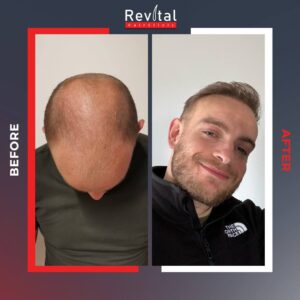
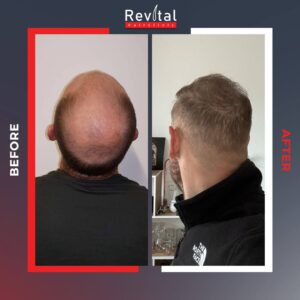





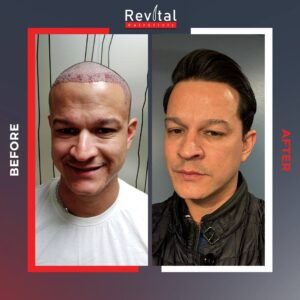
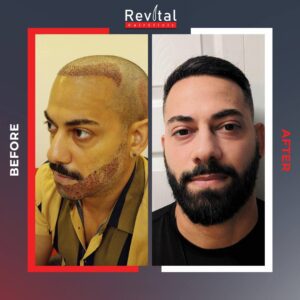
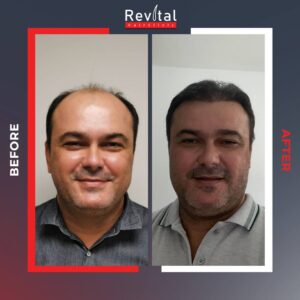
Leave a Reply